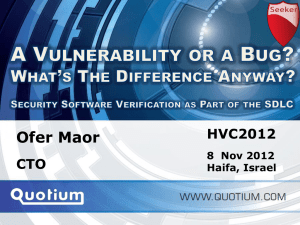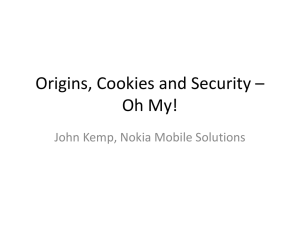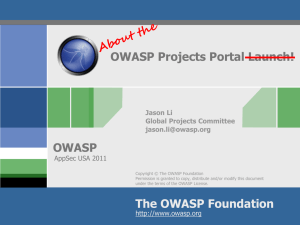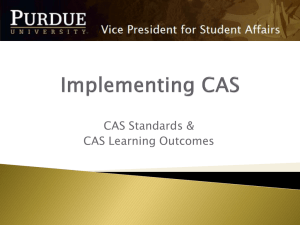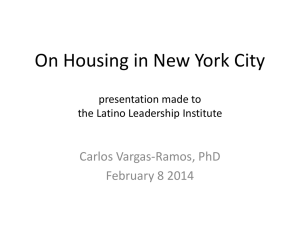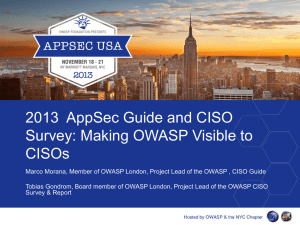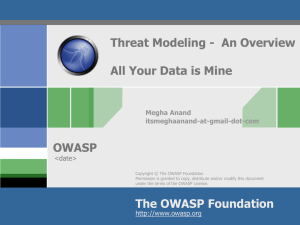Leveraging OWASP in Open Source Projects – CAS AppSec
advertisement
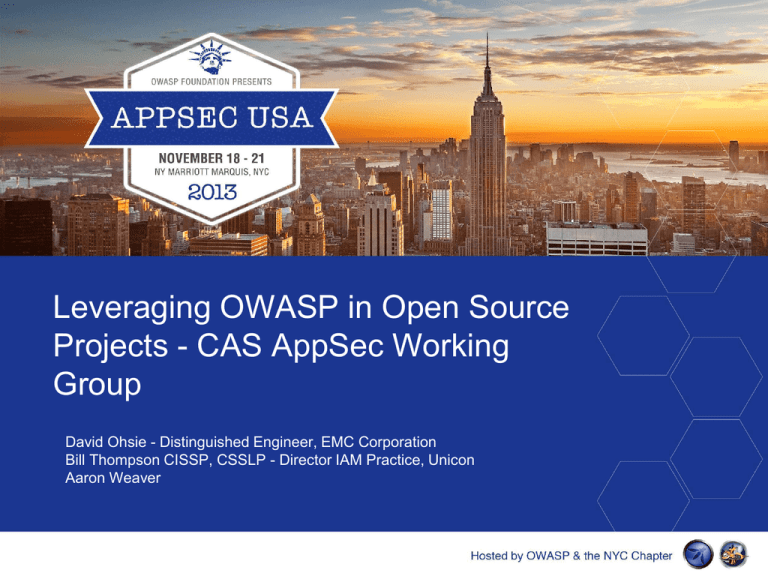
Leveraging OWASP in Open Source Projects - CAS AppSec Working Group David Ohsie - Distinguished Engineer, EMC Corporation Bill Thompson CISSP, CSSLP - Director IAM Practice, Unicon Aaron Weaver Hosted by OWASP & the NYC Chapter Central Authentication Service (CAS) Simple, Flexible, Extensible Open Source Web Single Sign-On for the Enterprise ● ● ● ● ● ● ● ● ● Alfresco Confluence DokuWiki Drupal Google Apps JIRA Joomla! Liferay MediaWiki Hosted by OWASP & the NYC Chapter ● ● ● ● ● ● ● ● ● Moodle OpenCMS PeopleAdmin Roller Sakai Twiki uPortal Wordpress Zimbra ● ● ● ● ● ● ● Spring Security Apache Shiro Java CAS Client .Net CAS Client php CAS Client mod_auth_cas ASP to Zope Central Authentication Service (CAS) ● CAS initially create by Shawn Bayern in 2001 at Yale ● CAS3 jointly designed and developed by Rutgers and Yale in 2005 as Jasig project ● Simple protocol, flexible architecture, wide deployment Hosted by OWASP & the NYC Chapter Central Authentication Service (CAS) But...is it secure? How do we know? ● ● ● ● Based on Kerberos Wide deployment and many eye balls Reports of dynamic scans from time to time Maybe we should really check? Hosted by OWASP & the NYC Chapter Central Authentication Service (CAS) CAS AppSec Working Group - Jan 2013 • • • • Joachim Fritschi Jérôme Leleu Misagh Moayyed Parker Neff • • • • David Ohsie Andrew Petro Bill Thompson Aaron Weaver https://wiki.jasig.org/display/CAS/CAS+AppSec+Working+Group Hosted by OWASP & the NYC Chapter CAS AppSec Working Group Goals ● Proactively work to improve the security posture ● Respond to potential vulnerabilities ● Produce artifacts that help potential CAS adopters evaluate the security of CAS ● Create and maintain recommendations on good security practices for deployments Hosted by OWASP & the NYC Chapter Hosted by OWASP & the NYC Chapter Google pays coders to improve open-source security Hosted by OWASP & the NYC Chapter Open Source software needs to be open on software security. Hosted by OWASP & the NYC Chapter As an adopter or potential adopter I want to know how the project deals with security Hosted by OWASP & the NYC Chapter Security can be a strong “selling” point! Hosted by OWASP & the NYC Chapter Or it can detract from your project How to avoid being one of the "73%" of WordPress sites vulnerable to attack Hosted by OWASP & the NYC Chapter Vulnerability Handling Practices Hosted by OWASP & the NYC Chapter Hosted by OWASP & the NYC Chapter OSS AppSec Program ● ● ● ● ● ● Form a working group OWASP Resources Meet regularly Make it easy to report vulnerabilities Threat Analysis with Developers Run security tools (ZAP, Static Code) Hosted by OWASP & the NYC Chapter Contributors ● Use OWASP Resources and Libraries ● Threat Model ● Work with security researchers Hosted by OWASP & the NYC Chapter Make it easy to report a vulnerability ● Security issue email address ● Provide a PGP Key Hosted by OWASP & the NYC Chapter Static Code Analysis Issues were found, prioritized and worked through false positives Hosted by OWASP & the NYC Chapter Threat analysis: Purpose ● What people think/say: “We probably don’t have any major security issues.” ● Threat analysis gives you a way to systematically analyze the possible threats against your system and rank them by potential impact. ● Threat analysis also gives adopters the information they need to analyze the deployment of your system in their environment. Hosted by OWASP & the NYC Chapter Threat analysis: Methodology ● Decompose the application: Draw a dataflow diagram in order to enumerate the attack surfaces. ● For each attack surface, enumerate the threats to the system and rank them. ● For each threat, create a list of possible mitigations. ● More details: https://www.owasp.org/index.php/Application_Threat_M odeling Hosted by OWASP & the NYC Chapter CAS Appsec Experience ● Started with whiteboarding session at Apereo conference to produce initial DFD and threats ● Biweekly follow-up meeting via Webex ● Used STRIDE to help identify threats ● Results maintained on wiki page ● https://wiki.jasig.org/display/CAS/CAS+Threat+Modelin g Hosted by OWASP & the NYC Chapter CAS Context DFD Hosted by OWASP & the NYC Chapter CAS Protocol DFD HTTPS Username/Password + Application Service URL CAS Server SSO Session Cookie (TGT) Application Service Ticket (ST) Browser HTTP(S) Request + ST HTTP(S) + Optional Session Cookie Hosted by OWASP & the NYC Chapter Application CAS Client (Agent) STRIDE Threat Security Control Spoofing Authentication Tampering Integrity Repudiation Non-Repudiation Information Disclosure Confidentiality Denial of Service Availability Elevation of Privelege Authorization Hosted by OWASP & the NYC Chapter CAS Appsec Sample Threat ● Identifier: PC_3 ● Category: Information Disclosure ● Threat: The pgtIou and pgtId are send as GET parameters, which can be a problem as they might be stored in logs or indexed in internal search engines... ● Mitigation: Never log the GET parameters on the proxy callback url. Though, it might be not sufficient. Should we change the CAS protocol in the next revision (v4.0) to POST these parameters ? Hosted by OWASP & the NYC Chapter Classifying Remediation ● Easy: Security Guide Contents ○ Disable http ○ How to write a safe CAS client/plugin ○ Securing the ticket registry ● Harder: Change the code ○ Secure-by-default ○ Encrypted/signed ticket registry Hosted by OWASP & the NYC Chapter CAS Threat modeling results ● Classified 19 threat against the system ● Generated 10 proposals ● One proposal (secure-by-default) integrated into CAS 4.0 ● Paraphrase from a CAS committer: ○ “I thought when we started that we would not find any problems, but now I see that there are lots of improvements to be made” Hosted by OWASP & the NYC Chapter Challenges ● Even in a security project, features are favored over security! ● Difficult to get consistent participation (although a core of contributors have kept it up; thank you, Jérôme Leleu and co-presenters!) ● Difficult to get changes prioritized and into the project Hosted by OWASP & the NYC Chapter Application Security Professionals Find an open source project and volunteer! Hosted by OWASP & the NYC Chapter Thanks! David Ohsie Bill Thompson, CISSP, CSSLP IAM Practice Director, Unicon wgthom@unicon.net Aaron Weaver Hosted by OWASP & the NYC Chapter

